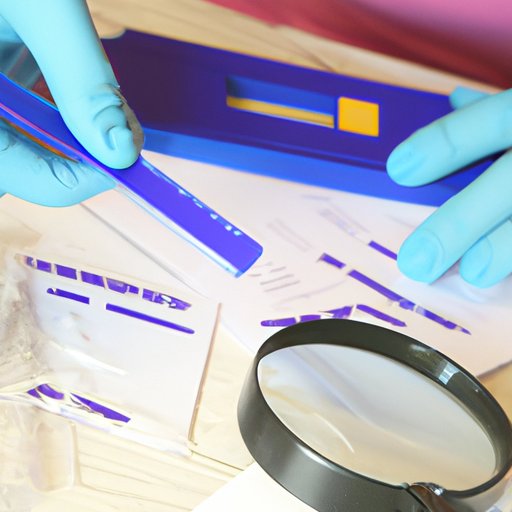Introduction
Forensic science is the application of scientific methods to criminal and civil investigations. It involves the collection, preservation, and analysis of evidence related to criminal cases, as well as providing expert testimony in court proceedings. This article will explore what is required to become a successful forensic scientist and the types of careers available.

Steps to Becoming a Forensic Scientist
Becoming a forensic scientist requires a combination of education, training, and certification. The exact requirements vary depending on the type of position, but the following steps should be taken:
Education Requirements
A minimum of a bachelor’s degree in a natural science such as chemistry, biology, or physics is usually required. Some positions may require an advanced degree such as a master’s or doctorate. Courses in forensic science, criminal justice, and law are also recommended.
Training Requirements
In addition to formal education, most employers require some form of on-the-job training. This can range from several weeks to a year or more, depending on the complexity of the job. Training typically includes instruction in laboratory techniques, evidence gathering and handling, and legal procedures.
Certification Requirements
Some states require that forensic scientists obtain certification through an accredited agency. Certification is intended to ensure that forensic scientists have the necessary knowledge and skills to perform their duties. In order to be certified, applicants must pass an examination that covers all aspects of forensic science.

Types of Forensic Science Careers Available
Forensic science is an interdisciplinary field that encompasses many different specialties. Some of the most common areas of specialization include:
Crime Scene Investigation
Crime scene investigators are responsible for collecting, preserving, and analyzing evidence at crime scenes. They must be familiar with the process of fingerprinting, photography, and other evidence-gathering techniques. They must also be able to interpret and communicate the results of their investigations.
DNA Analysis
DNA analysts use sophisticated techniques to analyze genetic material from a variety of sources, including bodily fluids, hair, and tissue samples. They must be knowledgeable about the latest advances in DNA technology and be able to interpret the results of their tests.
Toxicology Analysis
Toxicology analysts examine biological samples for the presence of drugs or other toxins. They must be able to identify, analyze, and interpret the results of their tests. Toxicologists also work with medical examiners and coroners to determine the cause of death in suspicious cases.
Digital Forensics
Digital forensics specialists analyze digital evidence such as computers, cell phones, and other electronic devices. They must be familiar with computer operating systems, network protocols, and encryption algorithms. They must also be able to interpret and communicate the results of their investigations.
Other Specialties
Other specialties within the field of forensic science include trace evidence analysis, handwriting analysis, ballistics, fire investigation, and forensic psychology. Each specialty requires specialized knowledge and skills.
Skills and Qualities Necessary for a Successful Career in Forensic Science
Successful forensic scientists must possess certain technical and non-technical skills. These include:
Technical Skills
Forensic scientists must have a thorough understanding of the scientific principles and techniques used in their field. This includes knowledge of lab equipment, data analysis, and chemical processing.
Problem-Solving Skills
Forensic scientists must be able to think critically and solve complex problems. They must be able to interpret data, develop hypotheses, and draw accurate conclusions.
Communication Skills
Forensic scientists must be able to effectively communicate their findings to colleagues, prosecutors, and juries. They must be able to explain complex concepts in a clear, concise manner.
Critical Thinking Skills
Forensic scientists must be able to evaluate evidence objectively and make sound judgments based on their observations. They must also be able to recognize patterns and draw logical conclusions.
Attention to Detail
Forensic scientists must pay close attention to detail in order to accurately assess evidence. They must be able to identify and analyze small pieces of information that could have an impact on the outcome of a case.
Analytical Ability
Forensic scientists must be able to analyze data and draw meaningful conclusions. They must be able to identify discrepancies and inconsistencies in evidence.

Benefits of Studying Forensic Science
Studying forensic science has many benefits. Those who pursue a career in this field can expect job security, professional development opportunities, and personal satisfaction. The work of forensic scientists is essential in helping to solve crimes and bring criminals to justice.
Conclusion
Forensic science is an exciting and rewarding field of study. Those who choose to pursue it must be prepared to invest time and effort into obtaining the necessary education, training, and certification. With hard work and dedication, those who study forensic science can look forward to a successful and fulfilling career.
(Note: Is this article not meeting your expectations? Do you have knowledge or insights to share? Unlock new opportunities and expand your reach by joining our authors team. Click Registration to join us and share your expertise with our readers.)
